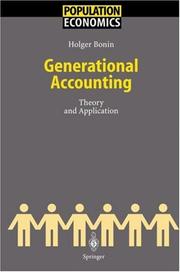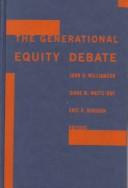| Listing 1 - 10 of 21 | << page >> |
Sort by
|

ISBN: 3540422668 Year: 2001 Publisher: Berlin : Springer,
Abstract | Keywords | Export | Availability | Bookmark
 Loading...
Loading...Choose an application
- Reference Manager
- EndNote
- RefWorks (Direct export to RefWorks)
Book
Year: 1995 Publisher: Cambridge, Mass. National Bureau of Economic Research
Abstract | Keywords | Export | Availability | Bookmark
 Loading...
Loading...Choose an application
- Reference Manager
- EndNote
- RefWorks (Direct export to RefWorks)
This paper shows how changes in generational accounts relate to the generational incidence of fiscal policy. To illustrate the relationship, it uses the Auerbach-Kotlikoff Dynamic Life-Cycle Simulation Model to compare policy-induced changes in generational accounts with actual changes in generations' utilities. The paper considers a wide range of policies in closed and small open economies as well as economies with and without capital adjustment costs. In general, changes in generational accounts appear to provide fairly good approximations to generations' actual changes in utilities. The approximations are better for living generations. They are worse for policies that involve significant changes in the degree of tax progressivity and for economies with sizable capital- adjustment costs. Finally, generational accounting needs to be adjusted in the case of small open economies to take into account the fact that the incidence of corporate taxation is on labor. The method of adjustment is simply to allocate changes in corporate tax revenues to generations in proportion to their changes in labor supply.
Book
Year: 2000 Publisher: Washington, D.C. : Congressional Budget Office,
Abstract | Keywords | Export | Availability | Bookmark
 Loading...
Loading...Choose an application
- Reference Manager
- EndNote
- RefWorks (Direct export to RefWorks)
Book
Year: 2001 Publisher: Cambridge, Mass. National Bureau of Economic Research
Abstract | Keywords | Export | Availability | Bookmark
 Loading...
Loading...Choose an application
- Reference Manager
- EndNote
- RefWorks (Direct export to RefWorks)
This paper extends the Ramsey model's normative analysis to issues of generational welfare and intergenerational transfers. A planner, who maximizes the discounted welfare of an endless stream of generations, is intrinsically biased against larger cohorts, which are more costly to provide utility. Imperfect production substitutability produces a market bias against baby booms as well, lowering their lifetime income. The market bias, however, tends to be greater than that of the planner, who provides the baby boom cohort with more favourable lifetime transfers. Intuitively, the baby boom benefits from temporarily reduced elderly dependency, allowing greater lifetime consumption relative to lifetime income. Declining population growth leads to rising elderly dependency, which the planner supports with increasing intergenerational transfers. Secularly rising social security taxes, and declining lifetime returns, with a baby boom cohort receiving more favourable treatment than their heavily burdened successors, are consistent with the wishes of a social planner in an environment with declining population growth.
Book
Year: 1999 Publisher: Cambridge, Mass. National Bureau of Economic Research
Abstract | Keywords | Export | Availability | Bookmark
 Loading...
Loading...Choose an application
- Reference Manager
- EndNote
- RefWorks (Direct export to RefWorks)
Against a background of projections of sharply increasing elderly dependency rates, workers in the major industrial economies are apprehensive that their social security benefit entitlements will be cut before or after they retire, leaving them with inadequate retirement income. This paper looks at recent benefit rule changes in the G7 countries to see what can be learned about such political risk in PAYG pension systems. From this small sample, I find that projections of rising costs under current rules are inducing reforms, and that these reforms often have a major impact on the present discounted value of promised benefits for middle-aged and younger workers. Usually, however, the benefits of the retired and those nearing retirement are protected. The phasing in of benefit cuts raises the question as to why younger workers are willing to take significant cuts in their implicit wealth while protecting the currently old. One possible answer is explored through a simple model: these workers fear even larger cuts in their benefits if the tax burden on future workers rises too high.
Book
Year: 2001 Publisher: Cambridge, Mass. National Bureau of Economic Research
Abstract | Keywords | Export | Availability | Bookmark
 Loading...
Loading...Choose an application
- Reference Manager
- EndNote
- RefWorks (Direct export to RefWorks)
Throughout the world, population aging is a major challenge that will continue well into the 21st century. While the patterns of the demographic transition are similar in most countries, timing differs substantially, in particular between industrialized and less developed countries. To the extent that capital is internationally mobile, population aging will therefore induce capital flows between countries. In order to quantify these international capital flows, we employ a multi-country overlapping generations model and combine it with long-term demographic projections for several world regions over a 50 year horizon. Our simulations suggest that capital flows from fast-aging industrial countries (such as Germany and Italy) to the rest of the world will be substantial. Closed-economy models of pension reform are likely to miss quantitatively important effects of international capital mobility.
Demographic transition. --- Generational accounting. --- Capital movements.
Book
Year: 1999 Publisher: Cambridge, Mass. National Bureau of Economic Research
Abstract | Keywords | Export | Availability | Bookmark
 Loading...
Loading...Choose an application
- Reference Manager
- EndNote
- RefWorks (Direct export to RefWorks)
Are market and voting institutions capable of producing optimal intergenerational risk-sharing? To study this question, we consider a simple endowment economy with uncertainty and overlapping generations. Endowments are stochastic; thus it is possible to increase the welfare of every generation using intergenerational transfers that might depend on the state of the world. We characterize the transfers that are necessary to restore efficiency and compare them to the transfers that take place in markets and voting institutions. Unlike most of that literature, we study both ex-ante and interim risk-sharing. Our main conclusion is that both types of institutions have serious problems. Markets cannot generate ex-ante risk-sharing because agents can trade only after they are born. Furthermore, markets generate interim efficient insurance in some but not all economies because they cannot generate forward (old to young) intergenerational transfers. This market failure, in theory, could be corrected by government intervention. However, as long as government policy is determined by voting, intergenerational transfers might by driven more by redistributive politics than by risk sharing considerations. Successful government intervention can arise, even though agents can only vote after they are born, but only if the young determine policy in every election.

ISBN: 0231112858 9780231112857 Year: 1999 Publisher: New York: Columbia university press,
Abstract | Keywords | Export | Availability | Bookmark
 Loading...
Loading...Choose an application
- Reference Manager
- EndNote
- RefWorks (Direct export to RefWorks)
Book
Year: 2000
Abstract | Keywords | Export | Availability | Bookmark
 Loading...
Loading...Choose an application
- Reference Manager
- EndNote
- RefWorks (Direct export to RefWorks)
A chronology of the 20th century that demonstrates that the U.S. found the requirements of strict neutrality less than useful for fulfilling its policy imperatives. Contents: the change (the Spanish-American War, the Mexican Revolution, avoiding World War I); the interwar period (the League of Nations, Havana Convention on Maritime Neutrality, the Kellogg-Briand Pact, an isolationist U.S.); fruits of isolationism; enter the U.N.; postwar "peace" (the Suez crisis, the Nixon doctrine, the 1971 Indo-Pakistani war, the bloody Lebanese "peace"); and perspective.
Generational accounting --- Entitlement spending --- Budget deficits --- Social security --- Medicare --- Finance. --- Neutrality --- United States --- Political science
Book
ISBN: 9782130844785 2130844782 Year: 2023 Publisher: Paris : Presses universitaires de France / Humensis,
Abstract | Keywords | Export | Availability | Bookmark
 Loading...
Loading...Choose an application
- Reference Manager
- EndNote
- RefWorks (Direct export to RefWorks)
Les droits de succession représentent un peu plus du centième des recettes fiscales en France. C'est peu mais plus que presque partout ailleurs : nombre de pays européens les ont ainsi supprimés depuis les années 2000. Ils sont par ailleurs de plus en plus impopulaires, près de neuf Français sur dix étant aujourd'hui favorables, dans toutes les couches sociales, à un allègement de l'impôt. Les élections de 2022 ont constitué pour l'impôt une épreuve de vérité, offrant un large éventail de propositions, de la suppression des droits en ligne directe pour la droite dure jusqu'au plafonnement de l'héritage transmissible pour la gauche radicale. Le diagnostic est clair : le scénario d'une mort lente de « l'impôt sur la mort » est le plus probable. Naguère, l'impôt était pourtant florissant et bien mieux toléré. Cet ouvrage montre que ces évolutions découlent d'un grand retournement idéologique après 1980, alimenté par le retour du patrimoine et sa diffusion dans les classes moyennes, ainsi que par le repli sur la famille en des temps de plus en plus individualistes et incertains. Désormais, concevoir les droits de succession comme un impôt de justice sociale, réducteur de l'inégalité des chances, ne suffit plus. Pour les sauver, il faut leur prêter une vocation complémentaire : ils pourraient constituer un mécanisme fiscal incitatif qui permette de financer à large échelle, par l'épargne abondante des seniors, les investissements d'avenir collectifs, productifs, écologiques et sociaux, dont nos sociétés ont tant besoin aujourd'hui.
Inheritance and transfer tax --- Inheritance and succession --- Famille --- Successions et héritages. --- Successions et héritages --- Comptabilité par génération --- Finances publiques --- Impôts. --- Successions et héritage --- Generational accounting --- Impôts
| Listing 1 - 10 of 21 | << page >> |
Sort by
|

 Search
Search Feedback
Feedback About UniCat
About UniCat  Help
Help News
News